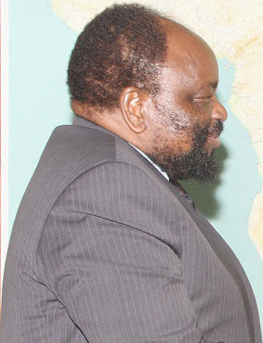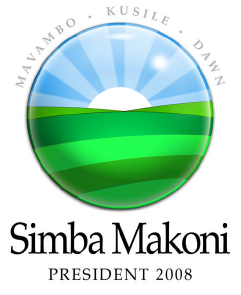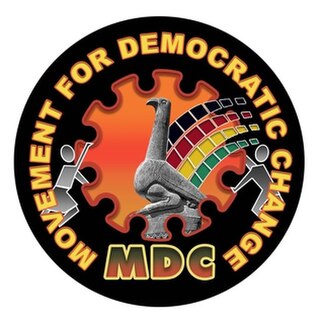Related Research Articles
Isaak Stanislaus Gorerazvo Mudenge was a Zimbabwean politician who served in the government of Zimbabwe as Minister of Foreign Affairs from 1995 to 2005 and as Minister of Higher Education from 2005 to 2012.

Simbarashe Simbanenduku Mumbengegwi is a Zimbabwean politician and diplomat currently serving as Minister of State for Presidential Affairs and Monitoring Government Programmes. Previously he was acting Foreign Minister for a few days following the resignation of former President Robert Mugabe He had previously served as Zimbabwe's Minister of Foreign Affairs from 2005 to 2017. From October to November 2017,he was Minister of Macro-Economic Planning and Investment Promotion.
Herbert Muchemwa Murerwa is a Zimbabwean politician. He served as the Finance Minister of Zimbabwe from April 1996 to July 2000,from August 2002 to February 2004,and again from 26 April 2004 to 6 February 2007. He has been Minister of Lands and Land Resettlement since February 2009.
Nathan Shamuyarira was a Zimbabwean nationalist who at different times fought on behalf of and helped lead FROLIZI,ZANU,and ZAPU. He later served as the Information Minister of Zimbabwe and as the Information Secretary of ZANU PF. He was writing President Robert Mugabe's biography at the time of his death.
Sydney Tigere Sekeramayi is a Zimbabwean politician who served in the government of Zimbabwe as Minister of Defence between 2013 and 2017. He has been a minister in the Cabinet since independence in 1980,serving as Minister of Defence from 2001 to 2009 and Minister of State Security from 2009 to 2013.
Patrick Antony Chinamasa is a Zimbabwean politician who served in the government of Zimbabwe as the minister of various cabinet ministries. Previously he served as the Minister of Finance and Investment Promotion and the Minister of Justice,Legal and Parliamentary Affairs.
Munyaradzi Paul Mangwana is a Zimbabwean politician,who has previously served in the cabinet of Zimbabwe.
Simbarashe Herbert Stanley Makoni is a Zimbabwean politician and was a candidate for the March 2008 presidential election against incumbent Robert Mugabe. He was Minister of Finance and Economic Development in President Robert Mugabe's cabinet from 2000 to 2002. He faced strong opposition during the Economic Change in Zimbabwe in the early 2000s as his policies contradicted those of the rest of the ZANU-PF party.
Obert Moses Mpofu is a Zimbabwean politician,who served as Minister of Home Affairs from 2017 to September 2018. Previously he was Minister of Macro-Economic Planning and Investment Promotion;Minister of Industry and International Trade;Minister of Mines and Mining Development;and Minister of Transport and Infrastructure Development. The Cabinet of Zimbabwe was later dissolved on 27 November 2017. He was reappointed as Minister of Home Affairs in Mnangagwa's first cabinet on 30 November 2017. The Culture portfolio was added to his ministry. Mpofu was later removed from the Zimbabwe cabinet in September 2018.

Kembo Dugish Campbell Mohadi is a Zimbabwean politician and former Vice-President of Zimbabwe who served from 28 December 2017 to 1 March 2021,when he resigned due to a sex scandal. He briefly served as the Minister of Defence,Security and War Veterans in 2017. Previously he was Minister of State for National Security in the President's Office from 2015 to 2017 and Minister of Home Affairs from 2002 to 2015.

Ignatius Morgen Chiminya Chombo is a Zimbabwean politician who was Finance Minister of Zimbabwe in 2017. Previously he has served in the Cabinet of Zimbabwe as Minister of Home Affairs from 2015 to 2017,Minister of Local Government,Public Works and Urban Development from 2000 to 2015.
Webster Kotiwani Shamu is a Zimbabwean politician and former Minister of Mashonaland West Provincial Affairs fired by President Emmerson Mnangagwa on 21 May 2018. He previously served as Minister of Information and Publicity,and Minister of State for Policy Implementation. He is a member of parliament representing the Chegutu constituency. The Cabinet of Zimbabwe was later dissolved on 27 November 2017.

In January,2008 the BBC reported that Simba Makoni might be nominated to run against Robert Mugabe in the Zimbabwean 2008 presidential election.
This article gives details about the vote counting system for the 2008 Zimbabwe presidential election
Zambian President Levy Mwanawasa called an emergency meeting of SADC leaders for 12 April during the 2008 Zimbabwe presidential election to discuss the post-election impasse. According to Mwanawasa,Zimbabwe's "deepening problems" meant that the issue needed to be "dealt with at presidential level". Jacob Zuma,meanwhile,said that he thought results should have already been announced,and he described the failure to release them as "unprecedented".
The second round of voting in the Zimbabwean presidential election of 2008 was held between Robert Mugabe and Morgan Tsvangirai after the first round failed to produce a 50% majority for either candidate. The election process was marred by violence against and intimidation of voters and party workers,which eventually led to the withdrawal of Tsvangirai from the poll. This left Mugabe as the winner of,effectively,a one-candidate election.

The 7th Parliament of Zimbabwe was a meeting of the Zimbabwean Parliament,composed of the Senate and the House of Assembly. It met in Harare over five sessions from 25 August 2008 to 27 June 2013. Its membership was set by the disputed 2008 Zimbabwean general election,which resulted in a ZANU–PF majority in the Senate and Movement for Democratic Change –Tsvangirai control of the House of Assembly. Political negotiations resulted in the 2009 Government of National Unity,a coalition government composed of ZANU–PF,the MDC–T,and the MDC–M.

The Movement for Democratic Change –Tsvangirai (MDC–T) is a centre-left political party and was the main opposition party in the House of Assembly of Zimbabwe ahead of the 2018 elections. After the split of the original Movement for Democratic Change in 2005,the MDC–T remained the major opposition faction,while a smaller faction,the Movement for Democratic Change –Ncube,or MDC–N,was led by Welshman Ncube.

General elections were held in Zimbabwe on 31 July 2013. Incumbent President Robert Mugabe was re-elected,whilst his ZANU–PF party won a two-thirds majority in the National Assembly.

General elections were held in Zimbabwe on 29 March 2008 to elect the President and Parliament. Because of Zimbabwe's dire economic situation,the elections were expected to provide incumbent President Robert Mugabe with his toughest electoral challenge to date. Mugabe's opponents were critical of the handling of the electoral process,and the government was accused of planning to rig the election. Human Rights Watch said that the election was likely to be "deeply flawed."
References
- ↑ "Zimbabwe Police Seize Opposition Leader's Passport" Archived 23 June 2007 at the Wayback Machine , VOA News, 16 June 2007.
- ↑ "Zimbabwe News" (PDF). Aluka. 26 (6). Retrieved 5 June 2022.
- 1 2 Dieter Nohlen, Michael Krennerich & Bernhard Thibaut (1999) Elections in Africa: A data handbook, p. 973 ISBN 0-19-829645-2
- ↑ ZBC Archives – December 1997: Nicholas Goche interview
- ↑ Zimbabwe Press Mirror – Volume 16 – Page 3 – 1997
- ↑ Cities of the World: A Compilation of Current Information on Cultural, Geographical, and Political Conditions in the Countries and Cities of Six Continents, Based on the by Brian Rajewski – 1998, p. 571
- ↑ "President unveils new ministers". Herald.co.zw. Retrieved 12 February 2020.
- ↑ "Federal Register :: Blocking Property of Persons Undermining Democratic Processes or Institutions in Zimbabwe". Archived from the original on 27 July 2021. Retrieved 31 July 2021.
- ↑ "Zimbabwe election results 2008" Archived 5 April 2008 at the Wayback Machine , Newzimbabwe.com, 31 March 2008.
- ↑ Barry Bearak, "Zimbabwe opponents begin talking about talks", International Herald Tribune, 10 July 2008.
- ↑ "Cabinet sworn in amid chaotic scenes" Archived 14 February 2009 at the Wayback Machine , Newzimbabwe.com, 13 February 2009.
- ↑ "Mugabe gives ally control of telecoms", Sapa-AFP (IOL), 10 April 2009.